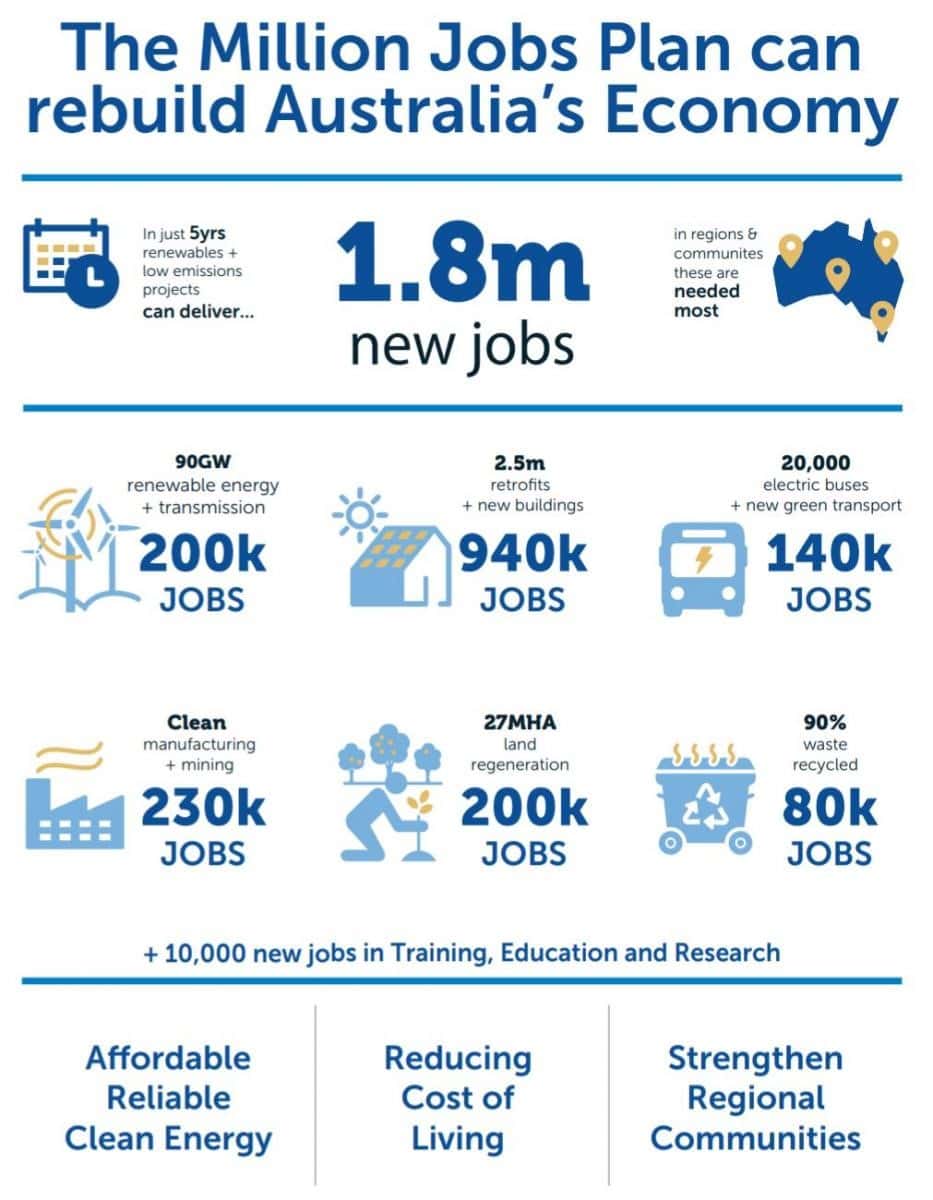
Chris Goebel
In July globally recognized climate thinktank Beyond Zero Emissions (BZE) released its Million Jobs Plan. The Plan lays out a comprehensive range of initiatives to rebuild Australia’s economy post-COVID by ramping up the transition to a zero-carbon economy. BZE received input from a range of contributors and advisors including Ross Garnaut, Malcolm Turnbull, Martijn Wilder and Richard Denniss. This is a list that PSC is very proud to add its name to.
When PSC heard that BZE was preparing the Million Jobs Plan we eagerly put our hand up to offer technical assistance. Spanning renewable energy, energy efficiency retrofits for homes, electrifying transport, land use, manufacturing and mining, we think it’s a fascinating and important read that offers solutions to two of Australia’s most urgent problems: climate change and economic recovery from COVID. A couple of the areas we provided advice on were transmission lines and the engineering versus economic trade-offs for line capacity, and advice on batteries and the economic drivers for storage.
You can read the full Plan here, but we thought we’d highlight some of the proposed projects and initiatives.

- The Plan proposes the creation of ‘renewable energy industrial zones’ where energy-intensive manufacturers can access fixed price, low-cost renewable energy.
- On the transmission infrastructure needed to support both renewable generation and energy-intensive zones, the Plan calls for private investment in transmission capacity to complement the 29 GW proposed in the ‘step-change’ scenario of AEMO’s ISP (Australian Energy Market Operator’s Integrated System Plan). Such private investment would overcome the regulatory lag caused by the current system, to bring capacity online more quickly. However there is a significant cost associated with such a move, given the cost burden is not being widely shared. Matt Robinson, PSC’s GM for OT and Market Systems, who provided advice on this section of the Plan, believes an alternative approach to planning and economic regulation could incentivize investment and share the burden to enable benefits to be realized that might otherwise be missed.
- Onshoring wind turbine manufacturing would create 9000 jobs, many of them factory jobs.
- A full embrace of the plan would create 10,000 new jobs in training, education and research, and create new jobs such as water rangers, hydrogen engineers, renewable energy aggregators, regenerative agriculture and carbon farming specialists.
- Using green hydrogen in steel production, would protect 37,000 existing jobs and create an extra 2000 short term and 1500 long term jobs
- If global food waste was a country, it would be the third-largest emitter of greenhouse gases in the world. For every 10,000 tonnes of waste recycled, 9.2 jobs are generated compared to just 2.8 jobs for landfilled waste.
- The Plan proposes a landscape regeneration program if done globally in the long term, would remove enough atmospheric carbon to ultimately reverse global warming.
- As well as being a substantial sink for storing carbon, soil carbon can also greatly improve water retention in soil. For every 1% of carbon added to soil, 144,000 liters of additional water can be held per hectare. An important benefit for our drought-ravaged farmers.
- Thirty-five cities around the world have signed up to electrify their entire bus fleets by the mid-2030s. In Shenzen China they have already transitioned their whole fleet to electric buses, with a resulting 20% reduction in the city’s emissions and a huge improvement to air quality. If we replaced just the third most polluting of our buses, we’d create 19,000 new manufacturing jobs.
These are just some of the initiatives proposed in BZE’s Million Jobs Plan. You can read the full Plan here and check out some of BZE’s other reports such as “Electrifying Manufacturing”, “Rethinking Cement” and “The 10 Gigawatt Vision”.
